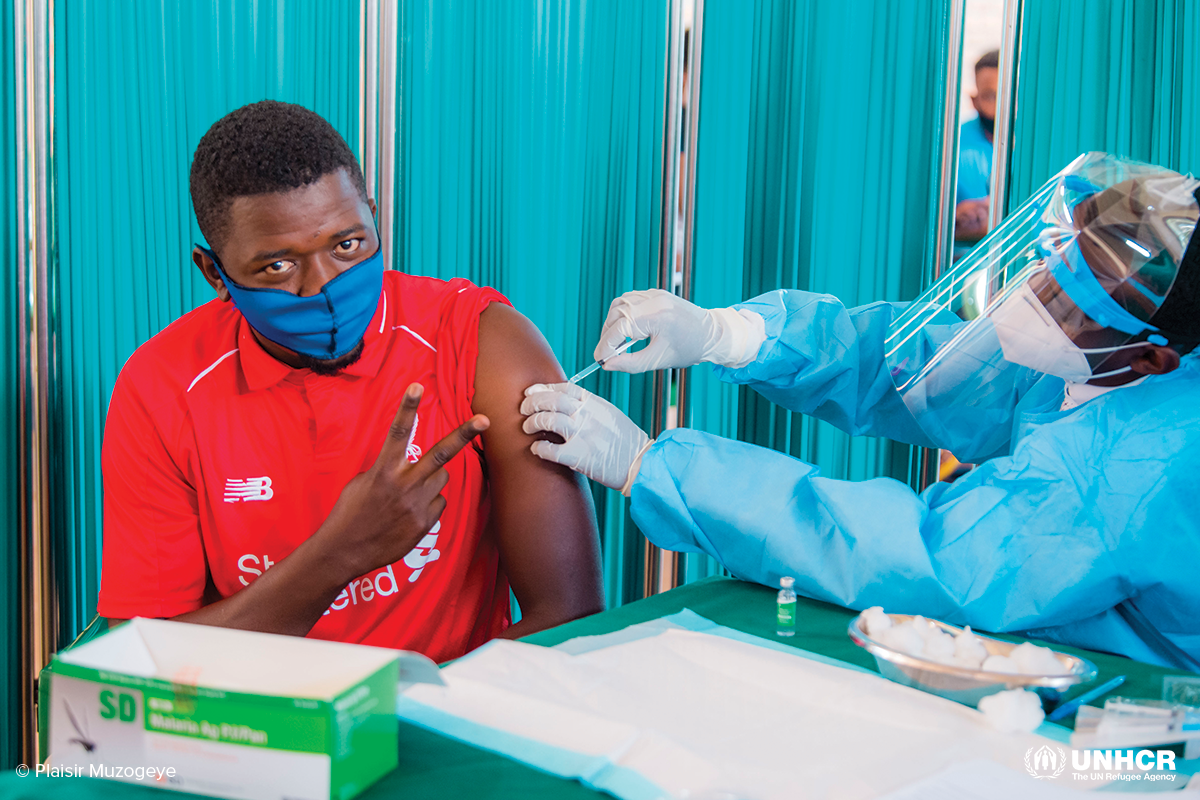Global Vaccine Equity: A Critical Role for the Private Sector

As the impacts of COVID-19 continue to be at the forefront for all of us – at home, at work and in our communities – USA for UNHCR and UPS partnered to bring together a virtual roundtable discussion with private sector leaders and the public health chiefs of both UNHCR and UNICEF, Drs. Ann Burton and Aboubacar Kampo. Through their expertise we were able to get an inside look at how the pandemic is impacting vulnerable populations, including refugees and displaced people. We also focused on the critical role the private sector can play in continuing to address the dire needs in terms of both global response and moving toward recovery, particularly with respect to providing support for equitable access to vaccines. Here are three key takeaways from our roundtable discussion:
New waves and variants make vaccines even more vital
The health and economic impact of the COVID-19 pandemic are well known. To date, there have been more than 153 million confirmed cases, and over 3.2 million people have died from the disease. According to the International Monetary Fund, the global economy shrunk by 3.5 percent last year because of the measures governments had to take to contain the virus, representing the deepest global recession since World War II.
No population or industry has been spared the impacts -- from the decimation of the tourism and hospitality industries, to the disruption in the retail and manufacturing sectors and global supply chains. Groups most acutely and adversely impacted include women, youth, the poor, the informally employed and those who work in contact-intensive jobs. Never before have so many lives, livelihoods and economies depended on a single health intervention: a COVID-19 vaccine. While vaccine development, approvals and initial distributions have raised hopes of a turnaround in the pandemic, renewed waves and new variants of the virus pose significant concerns – as we are now seeing in India, with the awful levels of infection and death coming 14 months after the WHO declared COVID-19 a pandemic.
Equitable access is the only path to progress
So far, more than 1 billion COVID-19 vaccine doses have been administered worldwide -- enough doses to fully vaccinate 6.7 percent of the global population. We have a long way to go in terms of sheer numbers of people who need access to vaccines, and to date there is still a stark gap between vaccination programs in different countries, with countries such as Israel, the UK, the U.S. and Chile having fully vaccinated between 42 and 60 percent of their populations and growing but others still not even at percent. According to reporting from the New York Times, 83 percent of vaccinations have been administered in high- and upper-middle income countries. Unfortunately, COVAX, a global effort of governments and manufacturers to promote the equitable procurement and distribution of COVID-19 vaccines throughout the world, still has shipped only 53 million doses against its goal of 2 billion doses by the end of 2021.
Helpfully, several vaccines have been produced in record time, and 1 billion doses is certainly a start, but when only 0.2 percent of doses have been administered in low-income countries, we can’t say that we are “all in this together.”
Coming together to deliver good
We applaud the individuals, governments and corporations that have stepped up to support the largest vaccination effort in history. During our discussion with private sector leaders on this topic, the overwhelming response was “how can we help?”. Based on our experience and the contributions of our partners, we offer three recommendations:
- Use your voice. The private sector is uniquely positioned to use its voice and influence -- to join in public awareness campaigns on the importance of vaccination and to use its influence to advocate for vulnerable populations, including refugees and displaced people, to be included in national vaccination plans in all countries around the globe. A good example of this is Pfizer’s advocacy for vaccine equity generally, as well as for inclusion of refugees and displaced people in Jordan, Bangladesh and Venezuela.
- Contribute your expertise. Whether it be dedicating knowledge, technology, capabilities or products, a range of companies across sectors have joined in the global COVID-19 response and vaccination effort -- from Google.org donating $15 million in ad credits and engineering expertise to UPS’s commitment to provide logistics expertise, cold-chain transportation services and ultra-low temperature freezer capacity to maintain vaccine viability. Coordinating responses through COVAX also allows for greater efficacy and efficiency.
- Give philanthropically. If your business model or sector does not readily lend itself to in-kind giving, consider making a financial contribution to GAVI, the global vaccination organization managing COVAX; UNICEF, the primary vaccination partner of COVAX; or UNHCR, the UN Refugee Agency.
Amid so much ongoing uncertainty, one thing we can say with absolute clarity is that we will only bring the pandemic under control when vaccines are available equally to all people. Excluding any vulnerable group from vaccination plans is not only immoral, but runs the risk of ongoing transmission of the virus within all populations. Given that we are in the midst of the largest global refugee crisis in history, we cannot ignore or leave behind these nearly 80 million people. No one is safe until everyone is safe, and in this life-and-death battle between vaccine and virus, everyone must play their part.


